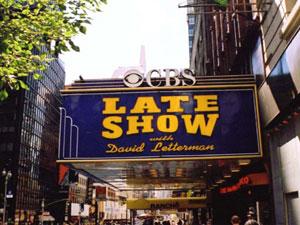David Letterman fights terrorism
Photo of the David Letterman studio. (Image by Flickr user Hey Paul (cc:by))
This story was originally covered by PRI’s The World. For more, listen to the audio above.
A cable, dated May 11, 2009, has the title: “Ideological and ownership trends in the Saudi media.” It begins by setting out how most media in Saudi Arabia are owned by members of the royal family, meaning there’s a lot of self-censorship going on.
But it continues by saying how much the Saudi media landscape is changing “fueled by increased demand by Saudi and pan-Arab audiences, new licensing agreements with US and other international media and an unprecedented level of openness to outside ideas.”
The cable was written after U.S. officials interviewed a range of Saudi TV editors and managers, many of whom, it says, are “well-educated and relatively pro-US”
One of those editors mentioned programming particularly popular among Saudis — TV shows full of those outside ideas. Those shows included The Late Show with David Letterman, Desperate Housewives, Friends, plus news programs from ABC and CBS, “all uncensored and with Arabic subtitles.”
There’s additionally a channel that screens American movies, also subtitled. One of the Saudi editors told US diplomats that these movies are popular in remote, conservative areas of Saudi Arabia, “where he said you no longer see Bedouins, but kids in western dress who are now interested in the outside world.”
What’s especially interesting is that, according to this cable, American officials were told that this kind of regular TV was more effective in winning over Saudis than more explicit forms of propaganda, such as Al Hurra, the news network funded by the US government. Maybe that’s why the author of the cable titled this section, “David Letterman, Agent of Influence.”
Then again, if you’ll permit me to speak personally for a moment, I remember lots of subtitled American shows on Saudi TV when I was growing up. I spent a few years of my childhood in Riyadh.
Surely there could be no greater model for supportive, tolerant relationships than Star Trek: The Next Generation. Take this encounter between two innocents, a young boy and an android named Data.
DATA: I am not capable of hatred.
BOY: No emotions? You can’t be happy or sad?
DATA: That is correct.
BOY: Why not?
DAYA: My positronic brain is not capable of generating those conditions. Good bye.
That was in the late 80s and early 90s. Even Data couldn’t stop what was to come. Indeed the cable notes that a dose of American TV isn’t likely to do away with violent extremists on its own. According to the leaked cable, one US official was told by a Saudi, “You still have to be careful. They’re still out there.”
Then again so are reruns of Friends. And, you know what, thinking about it, I’m betting on Rachel.
PRI’s “The World” is a one-hour, weekday radio news magazine offering a mix of news, features, interviews, and music from around the globe. “The World” is a co-production of the BBC World Service, PRI and WGBH Boston.
Every day, reporters and producers at The World are hard at work bringing you human-centered news from across the globe. But we can’t do it without you. We need your support to ensure we can continue this work for another year.
Make a gift today, and you’ll help us unlock a matching gift of $67,000!
